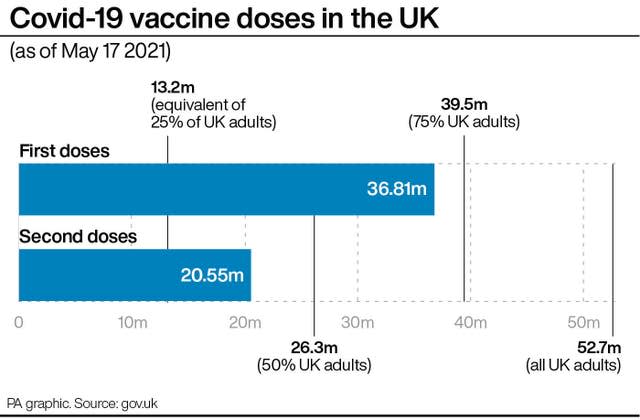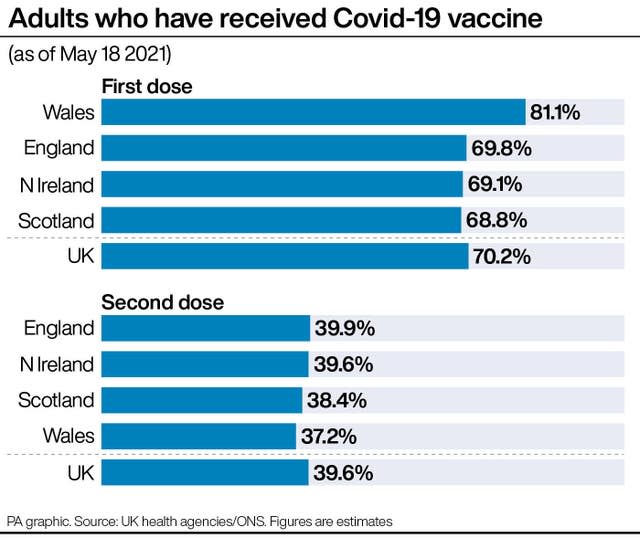PM says ‘amber list’ travel only in extreme circumstances as EU loosens rules

The European Union will give fully vaccinated tourists the green light to visit resorts – but Boris Johnson insisted that holidays in Spain and France remain off limits for now.
The Prime Minister sought to clarify confusion over the “amber list” of countries, including most European destinations, to which travel is allowed but not encouraged.
Mr Johnson insisted the position was “very clear” and people should only travel to an amber list country “for some extreme circumstance, such as the serious illness of a family member”.
“You should not be going to an amber list country on holiday,” the Prime Minister told MPs.
His comments came after EU ambassadors backed plans to allow vaccinated UK holidaymakers to visit the bloc this summer.
Watch: Health Secretary - You should not go to amber list countries on holiday
They recommended at a meeting on Wednesday that rules should be changed to allow non-essential visits into the EU by people who have had the full course of doses.
The policy will need to be formally signed off by ministers of member states.
European Commission spokesman Christian Wigand said: “The council will now recommend that member states ease some of the current restrictions, in particular for those vaccinated with an authorised vaccine.”
People in England are able to use an NHS app to display proof of their vaccination status.
A separate decision on whether to add the UK and other countries to the EU’s “safe list” will be made on Friday.

Travellers from locations on the list are permitted to enter the bloc even if they are not vaccinated, but are generally required to show evidence of a recent negative test.
Portugal and Greece are among the EU countries that have broken ranks by already welcoming UK tourists, but the addition of the UK to the “safe list” would boost the chances of a major summer getaway.
The UK’s “green list” of destinations includes Portugal, along with Gibraltar, Israel, Australia, New Zealand, Singapore, Brunei, Iceland and the Faroe Islands, plus several small remote islands which are British Overseas Territories.
Travellers returning from a country or territory on that list will not need to quarantine, and will only be required to take one post-arrival coronavirus test.
Passengers arriving from amber list countries are required to self-isolate for 10 days and take two tests.
But the rules have caused confusion, with mixed messaging from ministers adding to the lack of clarity.

Environment Secretary George Eustice said people could go to amber-listed countries to visit family or friends as long as they observed quarantine rules on their return, while Welsh Secretary Simon Hart said “some people might think a holiday is essential” and therefore a valid reason to travel.
At Prime Minister’s Questions Labour leader Sir Keir Starmer said: “The Government has lost control of the messaging.”
Monday’s move to the new traffic light system weakened travel restrictions by moving 170 countries or territories to the amber list, he added.
“Since the Government loosened travel restrictions, 150 flights a day are going to amber list countries and travel agents are reporting surges in holiday bookings to those countries,” Sir Keir said.
The Prime Minister said the UK has “one of the strongest border regimes anywhere in the world”, adding 43 countries are on the red list to which travel is effectively banned.
He added: “If you travel to an amber list country for any emergency, any extreme reason that you have to, when you come back, you not only have to pay for all the tests but you have to self-isolate for 10 days – we will invigilate, we are invigilating it, and people who fail to obey the quarantine can face fines of up to £10,000.”
George Morgan-Grenville, founder and chief executive of travel company Red Savannah, said the industry is “facing a disaster” and cannot understand why it “has to bear the brunt of so much confused and mixed messaging from ministers”.
He told BBC Radio 4’s Today programme: “There are 10,000 lorries every day coming into this country through British ports, and those drivers are only required to take a lateral flow test.
“So the idea that people not going on holiday is going to shut out every virus is nonsensical.”
International travel rules for England, Wales and Scotland are broadly similar.
In Northern Ireland, journeys to the Common Travel Area – which consists of the UK, Republic of Ireland, Channel Islands and Isle of Man – for visits to family and friends will be allowed from May 24.
But the Stormont Executive has not made a decision about the resumption of international leisure travel from Northern Ireland.

In other developments:
– Three people have died in Scotland due to coronavirus vaccine adverse-effects, out of 2.81 million who received at least one dose by April 30.
– The Prime Minister said there was increasing confidence that the vaccines being used work against all variants, including the highly-transmissible Indian strain.
– David Greenhalgh, Conservative leader of Bolton Council, warned there was a “danger of unrest” if local lockdowns were imposed to curb the spread of the Indian variant.
The travel rules are aimed at preventing cases of coronavirus – and new variants – being imported into the UK.
But the spread of the Indian variant has underlined the problem, with shadow health secretary Jonathan Ashworth telling Sky News “our borders have been about as secure as a sieve throughout this crisis”.
Watch: What UK government COVID-19 support is available?

 Yahoo News
Yahoo News 